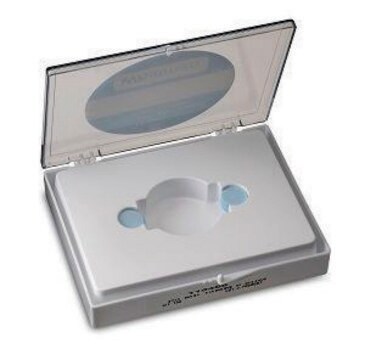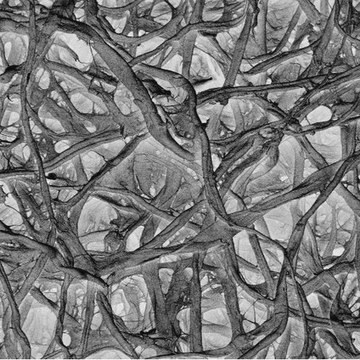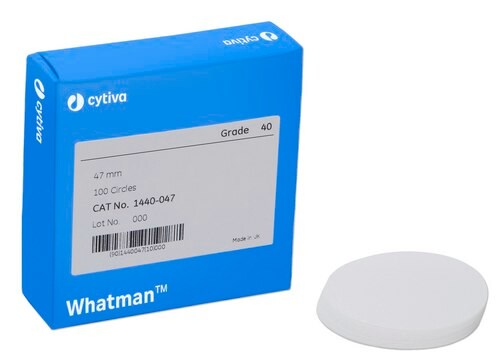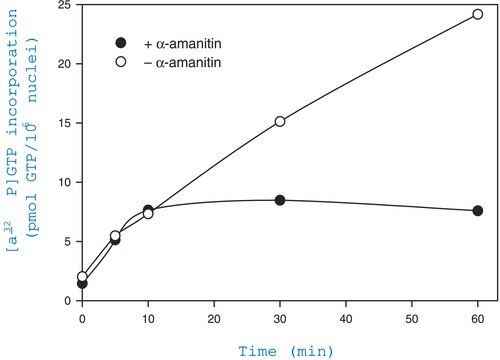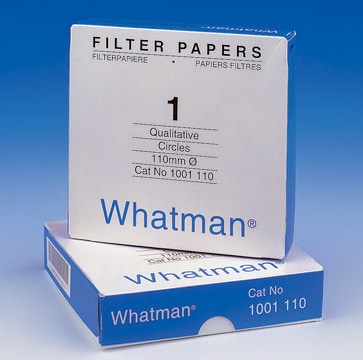WHA70602513
Whatman® polycarbonate Cyclopore® filter discs 5 μm pore size
translucent, hydrophobic, 100 ea, 25 mm diam
Sinonimo/i:
Z745731, filtration membranes, polycarbonate filters, polycarbonate membrane filters
About This Item
Prodotti consigliati
product name
Whatman® Cyclopore® polycarbonate and polyester membranes, cyclopore PC circles, 5.0 μm, 25 mm, 100/pk
Materiali
PC membrane
Sterilità
non-sterile
Confezionamento
pack of 100
Produttore/marchio commerciale
Whatman 7060-2513
Whatman Article No. 28420641 (US reference)
Diametro
25 mm
Dimensione pori
5 μm
Cerchi prodotti simili? Visita Guida al confronto tra prodotti
Descrizione generale
Whatman Cyclopore membranes are true pore size microporous membranes featuring sharp cut-off and reproducible microfiltration performance characteristics of track etched membranes. The smooth flat membrane ensures particles are retained on the surface so that they are easily visible under a microscope.
Cyclopore membranes are manufactured using proprietary Whatman technology to produce a precision membrane filter with a closely controlled pore size distribution.
Membranes are produced from a pure polymeric film and give exceptional chemical cleanliness. They are free of contaminants, have low tare weight, minimum water adsorption, and very low levels of nonspecific protein binding.
The polycarbonate (PC) membranes are hydrophilic and are available in a choice of diameters and pore sizes. The polyester (PE) membranes are resistant to most organic solvents, amides, and halogenated hydrocarbons. This broad chemical compatibility makes them suitable for the detection of particles in many corrosive fluids.
Applicazioni
- Air monitoring - Trace elements (chemicals, radioactivity) and particulate analysis (dust, pollens, and airborne particles)
- Analytical methods - Gravimetric analysis, densitometry, emission spectroscopy, x-ray fluorescence, and infrared analysis
- Water analysis - Absorbable organic halides (AOX), direct count of microorganisms, marine biology and dissolved phosphates, nitrates, and ammonia analysis
- Blood filtration and cell analysis - RBC deformability, leukocyte removal, RBC filtration and plasmapheresis, chemotaxis, cytology, and cell culture
- General filtration - Particulate and bacteria removal, cross flow filtration, HPLC sample preparation, and solution filtration
- Microscopy - Electron microscopy, epifluorescence microscopy, and direct optical microscopy
- Microorganism analysis - Direct total microbial count, harvesting, concentration, fractionation, yeast, molds, Giardia, Legionella, coliform, and canine microfilaria
- Nucleic acid studies - Alkaline elution and DNA fragment fractionation
- Oceanographic studies - provide a new tool for studying planktonic organisms. These ultra thin transparent membranes are strong yet flexible, allowing for planktonic samples to be filtered and the membranes to be mounted directly onto microscope slides. (Ref: Hewes et al. 1998; Graham and Mitchell 1999; Graham 1999.)
- Biosensors - as a barrier offering controlled diffusion for biological reagents and electrochemical detectors
- Diagnostic assays - for flow control, sample preparation, blood separation, and capture of latex microparticles
- Cell biology - for cell culture, chemotaxis, and cytological analyses, e.g., direct staining, isotopic and fluorescence based assays
- Transdermal drug delivery - as an inert matrix for retention of therapeutics
Caratteristiche e vantaggi
- Low affinity for stains providing higher optical contrast and making visibility under a microscope easy
- True surface capture provides easy examination of samples and short analysis times
- Totally transparent membranes available
- Negligible absorption and adsorption of filtrate; nonhygroscopic
- Low tare weights
- No particle shedding provides ultra clean filtrate
- Biologically inert
Altre note
Note legali
Scegli una delle versioni più recenti:
Certificati d'analisi (COA)
Ci dispiace, ma al momento non ci sono COA disponibili online per questo prodotto.
Se ti serve aiuto, non esitare a contattarci Servizio Clienti
Possiedi già questo prodotto?
I documenti relativi ai prodotti acquistati recentemente sono disponibili nell’Archivio dei documenti.
Il team dei nostri ricercatori vanta grande esperienza in tutte le aree della ricerca quali Life Science, scienza dei materiali, sintesi chimica, cromatografia, discipline analitiche, ecc..
Contatta l'Assistenza Tecnica.